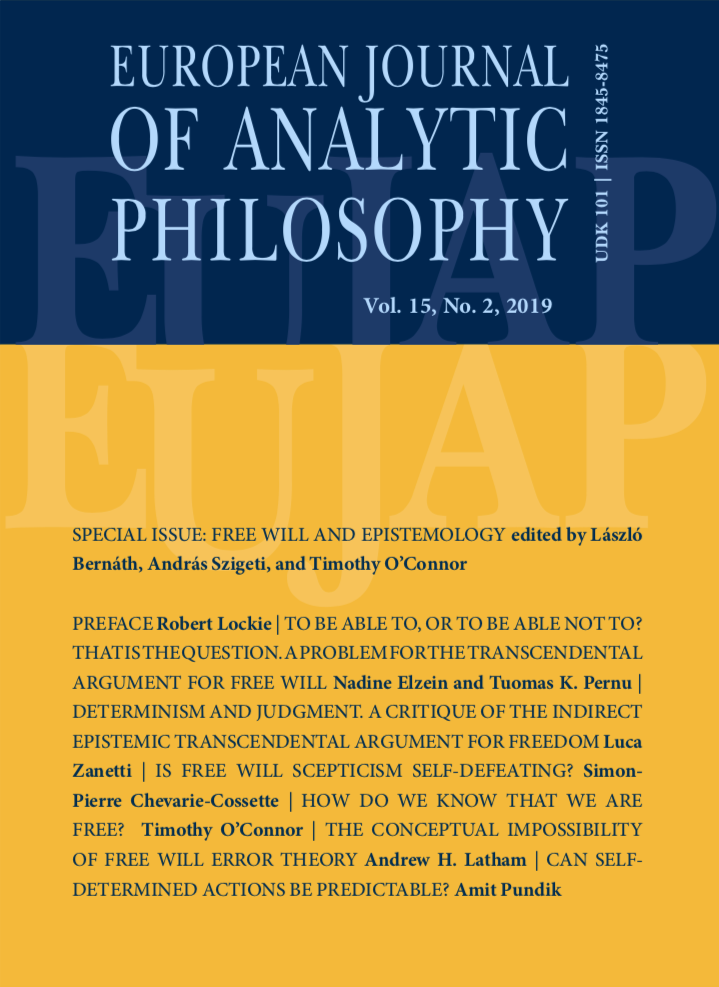View the whole issue here
- Fission, First Person Thought, and Subject-body Dualism
Kirk LudwigPages: 5-25 | Abstract | DOI: 10.31820/ejap.13.1.1
In “The Argument for Subject Body Dualism from Transtemporal Identity Defended” (2013), Martine Nida-Rümelin (NR) responded to my (Ludwig 2013) criticism of her (2010) argument for subject- body dualism. The crucial premise of her (2010) argument was that there is a factual difference between the claims that in a fission case the original person is identical with one of the successors. I argued that, on the three most plausible interpretations of ‘factual difference’, the argument fails. NR responds that I missed the intended, fourth interpretation, and that the argument on the third interpretation goes through with an additional assumption. I argue that the fourth interpretation, while insufficient as stated, reveals an assumption that provides an argument independently of considerations involving fission cases: in first person thought about future properties we have a positive conception of the self that rules out having empirical criteria of transtemporal identity. However, I argue that the considerations offered for this thesis fail to establish it, and that we do not, in fact, bring ourselves under any positive conception in first person thought, but rather think about ourselves directly and without conceptual mediation. This explains why it appears open in fission cases that the original person is identical with one of the successors, while what is possible is constrained by the actual nature of the self as referred to in first person thought. I argue also, incidentally, that on the third interpretation, the first premise of the argument is inconsistent with the necessity of identity. - Justifying Oneself
Mark PiperPages: 27-38 | Abstract | DOI: 10.31820/ejap.13.1.2
At present, the activity of justifying oneself is mostly discussed in psychology, where it is typically viewed as a negative or at least regrettable activity involving changing one’s attitudes, beliefs, and feelings in order to minimize psychological threats arising from cognitive dissonance. Yet there is conceptual space, even a need, for an analysis of justifying oneself that is more content-neutral in nature. In this paper I provide such an analysis. Along the way I also briefly canvass some of the empirical work on self- justification in psychology and gesture towards issues surrounding the normative significance of the practice of justifying oneself. - A Defence of a Rationalist Conception of Practical Reason
Gal YehezkelPages: 39-57 | Abstract | DOI: 10.31820/ejap.13.1.3
In this paper I attempt to refute the instrumental conception of practical reason, and thus defend a rationalist conception of practical reason. I argue that, far from merely playing an instrumental role, reason can be used by an agent to evaluate, that is, to approve or reject, final ends, which might be suggested by desires, and further to determine final ends independently of any desires, whether actual or potential, that the agent might have. My argument relies on an analysis of the concept of intention, and, more specifically, on the distinction between want and intention. I argue that the notion of an intentional action entails that reason can be used to evaluate and determine final ends. - “Yes, the theory is abstemious, but…”: A Critique of Yehezkel
Regan Lance ReitsmaPages: 59-79 | Abstract | DOI: 10.31820/ejap.13.1.4
This article is a critique of Gal Yehezkel’s attempt to refute subjectivism about normative practical reasons, a school of thought inspired by Hume. Yehezkel believes reason, far from being, as Hume puts it, “the slave of the passions,” has the normative authority to be a critic of basic desires and argues that subjectivism lacks the theoretical resources both to acknowledge this alleged truth and to analyze the distinction between wanting an outcome and intending to pursue it. I contend his refutation fails, largely because it operates with a strikingly attenuated view of the subjectivist theory.

